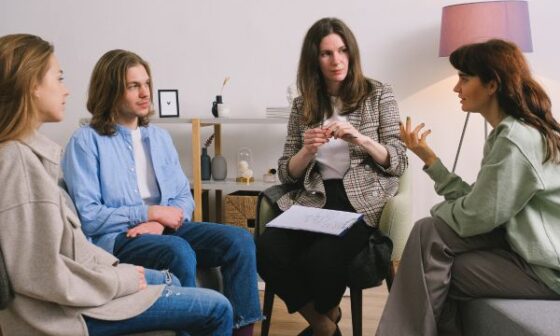Welcome to this comprehensive article on the topic of “I want an open marriage my husband doesn’t.” Exploring the concept of open marriages and the challenges that arise when partners have differing opinions, this article provides valuable insights and strategies for navigating such situations.
Whether you’re curious about open relationships or personally facing this dilemma, we aim to offer helpful information and guidance on finding common ground while maintaining a healthy and fulfilling relationship.
I Want An Open Marriage My Husband Doesn’t
The concept of an open marriage, where both partners have the freedom to engage in additional sexual or romantic relationships outside the marriage, is a topic that can be met with differing perspectives and opinions.
In some cases, one partner may express a desire for an open marriage while the other is opposed to the idea. This situation can lead to complex emotional dynamics and the need for open and honest communication within the relationship.
Definition Of Open Marriage
An open marriage is a type of consensual non-monogamous relationship in which both partners agree to have the freedom to engage in sexual and/or romantic relationships with other people outside of their primary partnership. Unlike traditional monogamous relationships, open marriages acknowledge and allow for emotional and/or physical connections with multiple partners.
In an open marriage, the boundaries and rules regarding outside relationships are typically discussed and established by both partners. These rules may include guidelines for communication, safe practices, disclosure of other relationships, and the level of emotional involvement allowed with other partners.
It’s important to note that open marriages are based on mutual consent, honesty, and ongoing communication. They are not about secrecy, infidelity, or pursuing relationships without the knowledge and agreement of both partners. Open marriages can take different forms and may involve various levels of emotional and sexual involvement with other individuals, depending on the preferences and boundaries established by the couple.
Importance Of Open Communication And Understanding In A Relationship
Open communication and understanding are fundamental pillars of any successful relationship, especially when it comes to navigating complex topics like desires for an open marriage. Here’s why these elements are crucial:
1. Expressing Needs and Desires
Open communication allows individuals to openly express their needs, desires, and feelings within the relationship. It creates a safe space where both partners can share their perspectives without fear of judgment or rejection.
2. Building Trust
Honest and open communication builds trust between partners. When discussing the desire for an open marriage, it’s important to be transparent about motivations, fears, and concerns. Trust is the foundation for a strong and secure relationship, and it enables partners to understand each other better.
3. Fostering Understanding
Open communication promotes understanding between partners. By openly discussing one’s desire for an open marriage, it provides an opportunity to share personal experiences, beliefs, and values. This understanding can lead to empathy and a deeper connection between partners.
4. Resolving Conflict
Conflict is natural in any relationship, especially when partners have differing opinions. However, open communication allows for constructive dialogue and problem-solving. It provides a platform for finding compromises and solutions that meet the needs of both partners.
5. Strengthening Emotional Bond
When partners engage in open communication, it strengthens the emotional bond between them. Sharing vulnerabilities, fears, and desires fosters intimacy and a deeper sense of connection. This emotional closeness can help partners navigate challenging situations with empathy and compassion.
6. Mutual Growth and Fulfillment
Open communication and understanding create an environment that supports individual growth and fulfillment within the relationship. By openly discussing desires and exploring alternatives like an open marriage, partners can find ways to meet their needs while maintaining a strong bond.
In summary, open communication and understanding are vital in addressing the desire for an open marriage. They allow for honest expression, trust-building, empathy, conflict resolution, and personal growth. By fostering these qualities, couples can navigate differences in desires and work towards finding common ground that respects the needs and values of both partners.
Personal Motivations For An Open Marriage
When considering an open marriage, individuals often have specific personal motivations that drive their desire for non-monogamy. Here are some common factors that may contribute to the desire for an open marriage:
1. Freedom and Autonomy
Some individuals crave the freedom to explore their sexuality and form connections outside of their primary partnership. They value the ability to make independent choices about their relationships and experiences.
2. Personal Growth And Exploration
Open marriages can provide opportunities for personal growth and self-discovery. By engaging with different partners, individuals can explore new aspects of their identity, desires, and boundaries, which can lead to enhanced self-awareness and personal development.
3. Emotional Needs
While emotional connection is typically strong within a primary partnership, some individuals may desire additional emotional connections with other people. They may find fulfillment in forming deep emotional bonds and intimate relationships outside of their primary relationship.
4. Sexual Exploration And Variety
Open marriages can offer the opportunity for sexual exploration and variety that may not be fully satisfied within a monogamous relationship. Exploring different sexual experiences and preferences can contribute to an individual’s sexual satisfaction and personal fulfillment.
5. Non-Possessiveness
Some individuals have a natural inclination towards non-possessiveness and believe that love and intimacy are not limited resources. They may view an open marriage as a way to embrace a more expansive understanding of love and relationships.
It’s important to note that personal motivations for an open marriage can vary significantly from one individual to another. These motivations should be explored and understood through open and honest communication with your partner to foster understanding and find common ground.
Understanding The Husband’s Perspective
In the context of desiring an open marriage when your husband does not share the same viewpoint, it is crucial to take the time to understand his perspective. Here are some key points to consider when seeking to understand your husband’s viewpoint:
1. Open And Empathetic Listening
Give your husband the opportunity to express his thoughts and feelings regarding the idea of an open marriage. Practice active listening, which involves fully focusing on his words, and seeking to understand his perspective without judgment or interruption.
2. Personal Beliefs And Values
Recognize that your husband’s opposition may be rooted in his personal beliefs and values surrounding monogamy, commitment, or emotional attachment. Respect his perspective and try to understand the reasons behind his stance.
3. Emotional Insecurities And Fears
Your husband’s opposition may stem from emotional insecurities or fears of potential negative consequences, such as jealousy, abandonment, or a perceived threat to the emotional connection between you both. Empathize with these concerns and be open to addressing them.
4. Communication And Relationship History
Reflect on your history of communication and the state of your relationship. Consider whether there have been prior discussions about openness, monogamy, or non-traditional relationship structures. Understanding your husband’s previous experiences and perspectives on these topics can provide valuable insight.
Remember, understanding your husband’s perspective does not necessarily mean agreeing with it. The goal is to foster open and respectful communication, create space for dialogue, and find common ground through empathy, compromise, and addressing his concerns.
By actively listening and understanding his viewpoint, you can lay the foundation for constructive conversations about the desire for an open marriage and work towards finding a mutually satisfactory resolution.
Finding Common Ground
When facing a situation where you desire an open marriage while your husband does not, finding common ground becomes essential for the health and longevity of your relationship. Here are some strategies to help navigate this complex issue and work toward a resolution:
1. Open And Honest Communication
Continually engage in open and honest communication with your husband. Share your desires, motivations, and feelings behind wanting an open marriage, and encourage him to express his concerns, fears, and boundaries. Create a safe space where both of you can openly discuss your perspectives without judgment.
2. Seek Professional Help
Consider seeking the guidance of a professional, such as a couples therapist or relationship counselor. A neutral third party can provide a supportive environment and offer insights, tools, and techniques to facilitate productive discussions and help find common ground.
3. Explore Alternative Relationship Structures
While your husband may not be open to the idea of a fully open marriage, there may be alternative relationship structures that could meet both of your needs. For example, you could explore the possibility of a semi-open relationship with agreed-upon boundaries and rules that align with both partners’ comfort levels.
Remember, finding common ground may require patience and understanding. It is essential to approach the process with respect for each other’s feelings and perspectives.
By actively working together, with the support of open communication and professional guidance if needed, you can explore possibilities that honor both partners’ needs and ultimately strengthen your relationship.
Considering Options And Potential Compromises To Preserve The Relationship
When facing the situation of desiring an open marriage while your partner does not, it is crucial to consider various options and potential compromises that can help preserve the relationship. Here are some strategies to explore:
1. Reflect On Individual Needs
Take the time to reflect on your own needs and desires for an open marriage. Consider whether these needs are essential for your personal fulfillment and growth or if there are alternative ways to address them within the existing relationship structure. Assessing the importance of these desires can help inform potential compromises.
2. Establish Boundaries
Engage in open and honest communication with your partner to establish clear boundaries that respect both your needs and comfort levels. These boundaries can include guidelines around emotional involvement, sexual encounters, communication protocols, and frequency of outside relationships.
Finding common ground on these boundaries can help create a compromise that maintains the relationship’s integrity.
3. Gradual Progression
If your partner is open to exploring the possibility of an open marriage but has concerns, consider starting with small steps or a gradual progression. This could involve experimenting with limited experiences, setting a trial period, or revisiting the arrangement periodically to assess how both partners are feeling. Gradual steps can provide a sense of security and allow for adjustment and reassessment along the way.
Conclusion
In conclusion, the decision to pursue an open marriage can be a complex and sensitive matter when partners have differing viewpoints. It requires open communication, empathy, and a willingness to understand each other’s needs and concerns. While finding common ground may not always be easy, seeking professional help or engaging in relationship counseling can provide valuable guidance.
Remember, the key to any successful relationship lies in respect, trust, and mutual consent. By fostering open dialogue and considering alternative relationship structures, it’s possible to navigate these challenges and create a fulfilling partnership that aligns with both partners’ desires and values.







